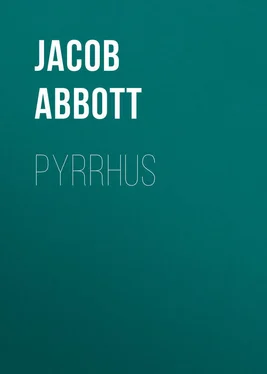Jacob Abbott - Pyrrhus
Здесь есть возможность читать онлайн «Jacob Abbott - Pyrrhus» — ознакомительный отрывок электронной книги совершенно бесплатно, а после прочтения отрывка купить полную версию. В некоторых случаях можно слушать аудио, скачать через торрент в формате fb2 и присутствует краткое содержание. Жанр: foreign_antique, foreign_prose, Историческая проза, на английском языке. Описание произведения, (предисловие) а так же отзывы посетителей доступны на портале библиотеки ЛибКат.
- Название:Pyrrhus
- Автор:
- Жанр:
- Год:неизвестен
- ISBN:нет данных
- Рейтинг книги:5 / 5. Голосов: 1
-
Избранное:Добавить в избранное
- Отзывы:
-
Ваша оценка:
- 100
- 1
- 2
- 3
- 4
- 5
Pyrrhus: краткое содержание, описание и аннотация
Предлагаем к чтению аннотацию, описание, краткое содержание или предисловие (зависит от того, что написал сам автор книги «Pyrrhus»). Если вы не нашли необходимую информацию о книге — напишите в комментариях, мы постараемся отыскать её.
Pyrrhus — читать онлайн ознакомительный отрывок
Ниже представлен текст книги, разбитый по страницам. Система сохранения места последней прочитанной страницы, позволяет с удобством читать онлайн бесплатно книгу «Pyrrhus», без необходимости каждый раз заново искать на чём Вы остановились. Поставьте закладку, и сможете в любой момент перейти на страницу, на которой закончили чтение.
Интервал:
Закладка:
Antipater on his death-bed, among other councils which he gave to Polysperchon, warned him very earnestly against the danger of yielding to any woman whatever a share in the control of public affairs. Woman, he said, was, from her very nature, the creature of impulse, and was swayed in all her conduct by the emotions and passions of her heart. She possessed none of the calm, considerate, and self-controlling principles of wisdom and prudence, so essential for the proper administration of the affairs of states and nations. These cautions, as Antipater uttered them, were expressed in general terms, but they were understood to refer to Olympias and Eurydice, whom it had always been very difficult to control, and who, of course, when Antipater should be removed from the scene, might be expected to come forward with a spirit more obtrusive and unmanageable than ever.
These counsels, however, of the dying king seemed to have had very little effect upon Polysperchon; for one of the first measures of his government, after Antipater was dead, was to send to Epirus to invite Olympias to return to Macedon. This measure was decided upon in a grand council which Polysperchon convened to deliberate on the state of public affairs as soon as the government came into his hands. Polysperchon thought that he should greatly strengthen his administration by enlisting Olympias on his side. She was held in great veneration by all the people of Macedon; not on account of any personal qualities which she possessed to entitle her to such regard, but because she was the mother of Alexander. Polysperchon, therefore, considered it very important to secure her influence, and the prestige of her name in his favor. At the same time, while he thus sought to propitiate Olympias, he neglected Cassander and all the other members of Antipater's family. He considered them, doubtless, as rivals and antagonists, whom he was to keep down by every means in his power.
Cassander, who was a man of a very bold, determined, and ambitious spirit, remained quietly in Polysperchon's court for a little time, watching attentively all that was done, and revolving silently in his mind the question what course he himself should pursue. At length he formed a small party of his friends to go away on a hunting excursion. When he reached a safe distance from the court of Polysperchon, he called his friends around him, and informed them that he had resolved not to submit to the usurpation of Polysperchon, who, in assuming the throne of Macedon, had seized what rightfully belonged, he said, to him, Cassander, as his father's son and heir. He invited his friends to join him in the enterprise of deposing Polysperchon, and assuming the crown.
He urged this undertaking upon them with very specious arguments. It was the only course of safety for them, as well as for him, since they – that is, the friends to whom Cassander was making these proposals – had all been friends of Antipater; and Olympias, whom Polysperchon was about to take into his counsels, hated the very name of Antipater, and would evince, undoubtedly, the most unrelenting hostility to all whom she should consider as having been his friends. He was confident, he said, that the Asiatic princes and generals would espouse his cause. They had been warmly attached to Antipater, and would not willingly see his son and rightful successor deprived of his legitimate rights. Besides, Philip and Eurydice would join him. They had every thing to fear from Olympias, and would, of course, oppose the power of Polysperchon, now that he had determined to ally himself to her.
The friends of Cassander very readily agreed to his proposal, and the result proved the truth of his predictions. The Asiatic princes furnished Cassander with very efficient aid in his attempt to depose his rival. Olympias adhered to Polysperchon, while Eurydice favored Cassander's cause. A terrible conflict ensued. It was waged for some time in Greece, and in other countries more or less remote from Macedon, the advantage in the combats being sometimes on one side and sometimes on the other. It is not necessary to detail here the events which occurred in the contest so long as the theatre of war was beyond the frontiers of Macedon, for the parties with whom we are now particularly dealing were not directly affected by the conflict until it came nearer home.
It ought here to be stated that Olympias did not at first accept the invitation to return to Macedon which Polysperchon sent to her. She hesitated. She consulted with her friends, and they were not decided in respect to the course which it would be best for her to pursue. She had made a great many enemies in Macedon during her former residence there, and she knew well that she would have a great deal to fear from their hostility in case she should return, and thus put herself again, as it were, into their power. Then, besides, it was quite uncertain what course affairs in Macedon would finally take. Antipater had bequeathed the kingdom to Polysperchon, it was true; but there might be great doubt whether the people would acquiesce in this decision, and allow the supreme power to remain quietly in Polysperchon's hands. She concluded, therefore, to remain a short time where she was, till she could see how the case would finally turn. She accordingly continued to reside in Epirus, keeping up, however, a continual correspondence with Polysperchon in respect to the measures of his government, and watching the progress of the war between him and Cassander in Greece, when that war broke out, with the utmost solicitude and anxiety.
Cassander proved to be too strong for Polysperchon in Greece. He had obtained large bodies of troops from his Asiatic allies, and he maneuvered and managed these forces with so much bravery and skill, that Polysperchon could not dislodge him from the country. A somewhat curious incident occurred on one occasion during the campaign, which illustrates the modes of warfare practiced in those days. It seems that one of the cities of Peloponnesus, named Megalopolis, was on the side of Cassander, and when Polysperchon sent them a summons to surrender to him and acknowledge his authority, they withdrew all their property and the whole of their population within the walls, and bid him defiance. Polysperchon then advanced and laid siege to the city.
After fully investing the city and commencing operations on various sides, to occupy the attention of the garrison, he employed a corps of sappers and miners in secretly undermining a portion of the wall. The mode of procedure, in operations like this, was to dig a subterranean passage leading to the foundations of the wall, and then, as fast as these foundations were removed, to substitute props to support the superincumbent mass until all was ready for the springing of the mine. When the excavations were completed, the props were suddenly pulled away, and the wall would cave in, to the great astonishment of the besieged, who, if the operation had been skillfully performed, knew nothing of the danger until the final consummation of it opened suddenly before their eyes a great breach in their defenses. Polysperchon's mine was so successful, that three towers fell into it, with all the wall connecting them. These towers came down with a terrific crash, the materials of which they had been composed lying, after the fall, half buried in the ground, a mass of ruins.
Читать дальшеИнтервал:
Закладка:
Похожие книги на «Pyrrhus»
Представляем Вашему вниманию похожие книги на «Pyrrhus» списком для выбора. Мы отобрали схожую по названию и смыслу литературу в надежде предоставить читателям больше вариантов отыскать новые, интересные, ещё непрочитанные произведения.
Обсуждение, отзывы о книге «Pyrrhus» и просто собственные мнения читателей. Оставьте ваши комментарии, напишите, что Вы думаете о произведении, его смысле или главных героях. Укажите что конкретно понравилось, а что нет, и почему Вы так считаете.












